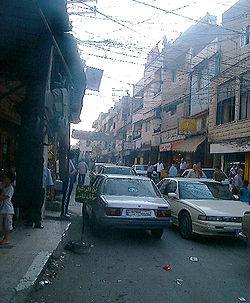Nahr el-Bared
|
An-Nahr al-Bared النهر البارد |
|
|---|---|
| refugee camp | |

Nahr al-Bared, summer 2005
|
|
| Country | Lebanon |
| Population | |
| • Total | approx. 30,000 |
Nahr al-Bared (Arabic: نهر البارد, literally: Cold River) is a Palestinian refugee camp in northern Lebanon, 16 km from the city of Tripoli. Some 30,000 displaced Palestinians and their descendents live in and around the camp, which was named after the river that runs south of the camp. Under the terms of the 1969 Cairo Agreement, the Lebanese Army does not conventionally enter the Palestinian camps, and internal security is provided by Palestinian factions.
The camp was established in December 1949 by the League of Red Cross Societies in order to accommodate the Palestinian refugees suffering from the difficult winter conditions in the Beqaa Valley and the suburbs of Tripoli. The camp was established outside any major Lebanese towns or settlements, which left Nahr al-Bared more isolated from the Lebanese society than many of the other camps in Lebanon. Despite this, due to its position on the main road to Syria and its proximity to the Syrian border, Nahr al-Bared grew to be a central commercial hub for the local Lebanese of the Akkar region.
Nahr al-Bared is located directly on the Mediterranean. It is made up of the "official" or "old" camp and the "unofficial" or "new" camp. The "old" camp is roughly 0.2 km² and is under the responsibility of UNRWA. The "new" camp extends mainly to the north of the old camp, but also to lesser degrees to the east and south. It is less densely populated and many wealthier families have built their homes there in recent years.
The camp is oblong shaped with the main road running straight through it (South to North), and the Souq running east to west. The different sectors of the camp are named after areas of what is now the northern Galilee region : Safourieh, Sasa, Safad, etc. Other sectors are more commonly known by the origins of the families living there: e.g. the "Maghrebi" area where families originally from Algeria, Tunisia or Morocco who had moved to Palestine in the 1930s now live.
...
Wikipedia
